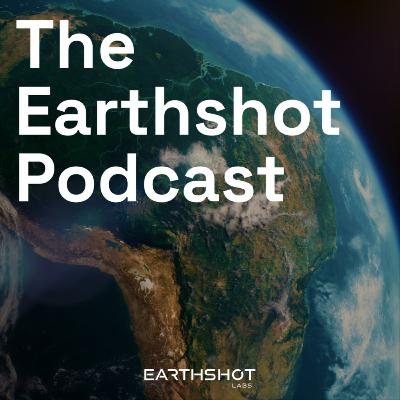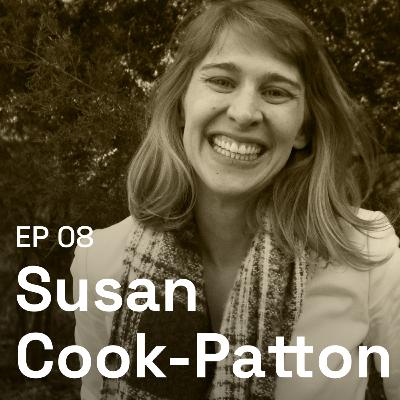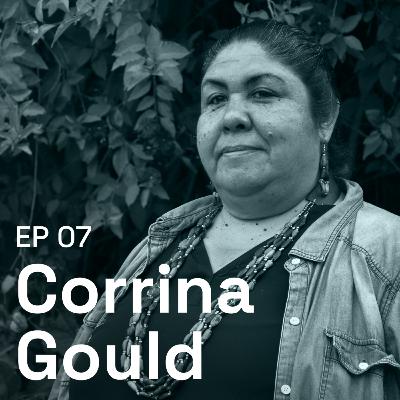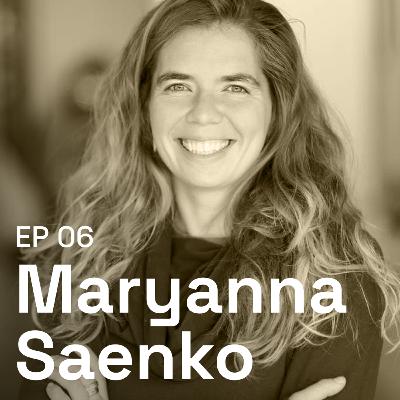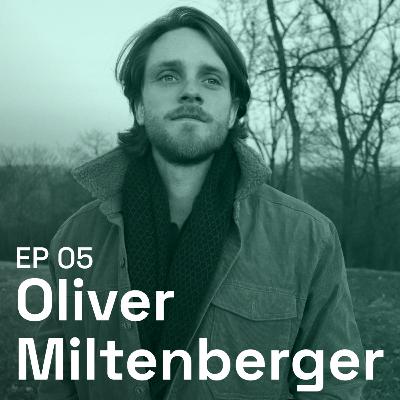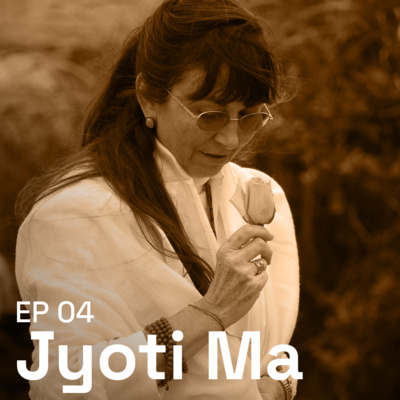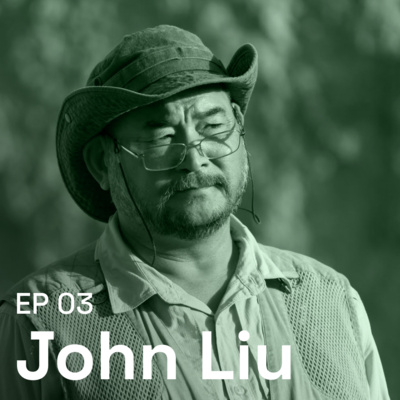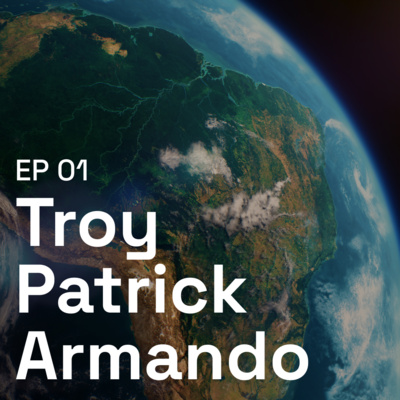Discover The Earthshot Podcast
The Earthshot Podcast

20 Episodes
Reverse
“Restoration is not just about planting trees or about making an area look beautiful again. It's about recreating a social ecological system that is more resilient and is more aligned with natural processes.” -Robin Chazdon
This episode features legendary ecologist Robin Chazdon with hosts Armando Davila, Patrick Leung, & Pedro Ribeiro Piffer for an adventure through the world of assisted natural regeneration. Robin discusses active versus passive regeneration, how to increase the capacity of local communities to lead restoration, and the importance of honoring traditional knowledge. Robin then paints a vision of a fair trade carbon market, discusses biodiversity monitoring, and explores the challenges of involving corporations in restoration projects. This rich conversation ends on an inspirational note as Robin skillfully describes how we are all interconnected with each other and the natural world.
IN THIS EPISODE:
How Robin started her journey as an ecologist and how her work has evolved over her career
Her current projects including the UN’s Best Practices Task Force
An overview of assisted natural regeneration
Active regeneration vs. passive regeneration
How to support farmers in regenerating their land
Robin’s view on monoculture plantations
How to decide which restoration approach to use
The important social considerations of restoration projects
How to increase the capacity of local communities to lead restoration
The importance of honoring local and traditional knowledge
Robin’s vision of a fair trade carbon market
Biodiversity monitoring as a way to measure the effects of restoration projects
The dangers of viewing nature as a corporate asset
The importance of channeling funds through ground-based mechanisms
What it will take for corporations to change their practices towards greater sustainability
The importance of recognizing that we are all in this together
How our humanity is dependent on our relationship with the natural world
The importance of multi-disciplinary collaboration & infiltrating the corporate sector
RELEVANT LINKS:
Earthshot Labs: www.earthshot.eco
Robin’s Linkedin: https://www.linkedin.com/in/robin-chazdon-96218a59/
Intro & Outro Music by Little Whale: https://littlewhale.bandcamp.com
Grant Wilson and Michelle Bender of Earth Law Center - Legal Rights of Nature
“How do you give nature a voice within carbon markets?” -Grant Wilson
Grant Wilson, Executive Director of Earth Law Center, & Michelle Bender, Ocean Campaigns Director of Earth Law Center, join hosts Armando Davila & Troy Carter for a discussion about the Rights of Nature Movement. After an overview of how this movement advocates for nature to have rights just as humans do, Grant and Michelle discuss traction that the movement is gaining in Ecuador and New Zealand and explore how this movement can be integrated with the carbon market’s financial approach to protect nature to the fullest extent possible. This deep conversation also includes a heart-centered discussion about how humanity, society, economics, and law are inseparable from nature and also explores the unique challenges of protecting the rights of our oceans. You’ll also learn more about the Earth Law Center and how you can get involved.
IN THIS EPISODE:
An overview of the rights of nature movement and Earth law
Rights of nature laws that are being enacted internationally
The articles of Ecuador’s rights of nature
An example of a successful lawsuit in the name of rights of nature
A journey into Ecuador’s Los Cedros cloud forest and how Earth law saved it from mining, setting a precedent for respecting the rights of nature
New Zealand’s journey of granting legal rights to its rivers
What rights of nature means in relation to indigenous worldviews
How the rights of nature movement can be integrated with the carbon market’s financial approach to protecting nature
Unique corporate structures where nature can be a shareholder or sit on a board of directors
How humanity, society, economics, and law are inseparable from nature
The dangers of viewing Earth as a machine and focusing on technological solutions for the climate crisis
How listeners can get involved in the rights of nature movement
Approaching decisions that may support human/societal development but may be harmful to nature (ie mining precious metals for technology)
How the rights of nature apply to oceans
How legal victories can change public opinion and vice versa
About the Earth Law Center
RELEVANT LINKS:
Earthshot Labs: www.earthshot.eco
Earth Law Center: https://www.earthlawcenter.org/
Intro & Outro Music by Little Whale: https://littlewhale.bandcamp.com
“We need all hands on deck in all areas, all sectors, and all approaches. So that means we need governments setting aggressive climate policy and regulation to control as far and fast as possible top-down, we need corporates and industry to do their part and do everything they can to decarbonize and squeeze out emissions…and then we also need market mechanisms like what Verra pioneers and helps manage that bring integrity and the ability for finance to flow to other activities that otherwise wouldn't be supported and are critical for us addressing the climate challenge.” -Toby Janson-Smith
David Antonioli, CEO at Verra, & Toby Jason-Smith, Chief Program Development & Innovation Officer at Verra, join hosts Armando Davila & Oliver Miltenberger for a rich discussion about carbon markets and the importance of standards and transparency. David and Toby begin by introducing us to Verra, a nonprofit organization setting the world’s leading standards for climate action and sustainable development, and continue on to discuss the past, present, and future of the carbon market and its role in addressing the climate crisis. They masterfully address questions, critiques, and challenges alive in the carbon market sector today and discuss what is needed for the carbon market to successfully play its part in creating a sustainable future for all.
IN THIS EPISODE:
An overview of nonprofit organization Verra as well as David’s and Toby’s roles there
The history of Verra and its evolution to what it is today
A history of the carbon market and how and why standards have been developed
The systems and processes needed to continue to scale the carbon market successfully
Why offsetting carbon is not enough and what else must be done
How the volunteer carbon market is positioned to put pressure on corporates to make internal carbon reductions
Why direct action within our economy to reduce emissions is needed first and foremost to address the climate crisis
How the carbon market is designed to offset residual emissions that cannot be reduced
Carbon markets as a way to jumpstart finance for new climate technologies and activities
How some countries are implementing carbon taxes to support the carbon market
Why clarity is needed around what carbon credit claims corporates can make and what these claims mean
How to address the current confusion in the carbon market today
The Integrity Council for Voluntary Carbon Markets and other initiatives meant to ensure that carbon credit issuers are meeting standards
Additionality explained
Why renewable energy projects are no longer creditable under Verra’s standards
Carbon removals vs avoidance reductions
Baselines explained
Creating a framework that values nature when projects don’t qualify for carbon credits
Climate community and biodiversity standards that are being used in addition to the core carbon standards
The challenges of estimating the actual success of project before it’s executed
How to ensure indigenous communities are being supported by local projects
The importance of learning and not letting perfect be the enemy of the good that’s happening
RELEVANT LINKS:
Earthshot Labs: www.earthshot.eco
Verra: https://verra.org
Kasigau Project: https://www.innovationforum.co.uk/articles/the-kasigau-corridor-redd-project
Intro & Outro Music by Little Whale: https://littlewhale.bandcamp.com
1. Richard Heinberg - Consuming Less Energy: Our Critical Transition
“Nature will win in the end and balance will be reestablished. The question is how is it going to happen and if we're working in the direction of rebalancing things and doing it from the standpoint of minimizing the casualties and maximizing the opportunities of the survivors.” -Richard Heinberg
Richard Heinberg, author and Senior Fellow at Post Carbon Institute, joins hosts Patrick Leung and Armando Davila for a deep conversation on the importance of reducing energy consumption for humanity’s transition to a sustainable existence on Earth. Richard sheds light on the harm that energy consumption causes, the history behind it, and the factors making it difficult to reduce. The discussion then moves to practical ways to reduce energy consumption, countries that are doing so on a large scale, how nature is supporting us in this transition, and how we can work together with nature to create a beautiful and sustainable future.
IN THIS EPISODE:
The impact of affluence on energy consumption
How using energy almost always causes environmental harm
The serious challenges with renewables
The only way the energy transition is likely to work
Why green growth is not enough without downsizing industrial society
Practical ways to live a lower consumption lifestyle
The hidden energy usage behind the green industry
How the field of economics is energy blind
The historical roots of consumerism
The importance of social innovation
How moving away from consumption is an act of resistance
Why continuous economic growth is unsustainable
The importance of periods of economic retraction
The countries that are leading the way in methods for reducing consumption
How consuming less doesn’t need to equate with a less happy life
The importance of conserving wild ecosystems for future generations
Nature’s tendency to always reestablish the balance of power
Why we need more optimistic post-apocalyptic fiction
The power of beauty and nature’s deliberate production of it
RELEVANT LINKS:
Earthshot Labs: www.earthshot.eco
Richard’s Website: https://richardheinberg.com
Post Carbon Institute: https://www.postcarbon.org/
Intro & Outro Music by Little Whale: https://littlewhale.bandcamp.com
In this season 1 wrap-up episode, hosts Patrick, Troy, and Armando reflect on the first season of the Earthshot Podcast, including themes and insights that emerged, favorite moments with guests, and the evolution of the podcast, of Earthshot Labs, and of the state of the climate crisis. Stay tuned for Season 2, coming in 2023!
RELEVANT LINKS:
Earthshot Labs: www.earthshot.eco
Troy Carter’s LinkedIn: www.linkedin.com/in/troyearthshot
Patrick Leung’s LinkedIn: www.linkedin.com/in/puiwah
Armando Davila’s Linkedin: www.linkedin.com/in/armando-davila-49681716
Intro & Outro Music by Little Whale: littlewhale.bandcamp.com
“What keeps me up at night is that people would think that we can use natural climate solutions like reforestation instead of fossil fuel reductions, because it’s not an either/or, it’s a both/and.” -Susan Cook-Patton
Susan Cook-Patton, a senior scientist at the Nature Conservancy, joins hosts Patrick Leung and Armando Davila for a deep dive into the science behind carbon and nature-based climate solutions. Susan gives us an insider’s look into the world of scientific data, sharing practical insights and revealing the gaps that exist in climate research. She shares that recent studies paint a dire picture of our future if we don’t act fast (within the next decade) to change our destructive course, and yet also shares her “stubborn optimism” that we will pull through. This delightful and deep conversation is both intelligent and love-filled and is a must-listen for anyone interested in science, nature, and sustainability.
IN THIS EPISODE:
Susan’s work as a carbon accountant
Reforestation as a powerful natural climate solution
The importance of local engagement in reforestation projects
Why good data is critical for addressing the climate crisis
Susan’s journey of becoming a climate scientist
How planting native trees supports the health of the entire ecosystem
The secret world of caterpillars
The abundance of information that’s already available to answer research questions
Why natural carbon solutions are not enough: It’s critically important to reduce carbon emissions as well!
Why no one single solution holds the answer
The ability of forests to rehabilitate themselves
Why mixed timber plantations are much better than monoculture plantations
Why we need more women in scientific professions
How we can improve knowledge sharing and the importance of open source data
Why more up-to-date information is needed in the scientific community
Biodiversity loss and how science can help
The importance of using conscious language when speaking about nature
Susan’s “stubborn optimism” for a better future and how she cultivates and shares it with others
RELEVANT LINKS:
Earthshot Labs: www.earthshot.eco
The Nature Conservancy: www.nature.org
Susan’s LinkedIn: https://www.linkedin.com/in/susan-cook-patton-ph-d-3904a448
Intro & Outro Music by Little Whale: https://littlewhale.bandcamp.com
“There is an abundance on this Earth and She was created with this idea of taking care of everything here. We're the ones that turned our backs to her and we have to figure out a way to get back and quickly.” - Corrina Gould
Corrina Gould, chair and spokesperson for the Confederated Villages of Lisjan, joins hosts Patrick Leung and Armando Davila in this episode for a deep conversation about rematriation and decolonization. Corrina begins by grounding us in the history of the Indigenous peoples of the so called Bay Area and then shares her inspiring journey of becoming an activist and leader in her community. Corrina’s grandmotherly embrace holds listeners with love as she takes us into the somber caverns of Indigenous genocide, climate crisis, and the violence our society faces today, while she similtenously paints a beautiful vision of what the future can be and lays out the work that is necessary to make it so.
IN THIS EPISODE:
A brief overview and history of Corrina’s people (the Lisjan), their territory (Huchiun), and their language (Chochenyo)
The abundance and beauty in the Bay Area as it was 200 years ago, when it was a place where people were never hungry or homeless, and the Lisjan songs of gratitude that have survived from that time
The dark history of the mission system that came and enslaved the Lisjan people and forced assimilation, and the US laws that made it illegal to be native and encouraged the killing of native peoples
How learning about this horrific history inspired Corrina to preserve and protect her culture and unerase her people
What white paper genocide is and how it continues to happen today
How Corrina and her community began leading shell mound walks to raise awareness about these sacred burial sites and to pray for their ancestors
The Sogorea Te’ Land Trust that Corrina helped established to facilitate the return of land to Indigenous people
How non-native peoples can support and participate in rematriation
The importance of learning the history and caring for the land where you live
What rematriation really means
How to approach land restoration projects with Indigenous people at the table as full partners
The importance of giving the land and waters rights
The lessons of Covid through an indigenous perspective
How the violence plaguing our society today stems back to heteopatriarchy and white supremacy making people feel like they’re not enough
The importance of coming of age ceremonies and providing our young people with connection to their humanity and to the Earth
RELEVANT LINKS:
Earthshot Labs: www.earthshot.eco
Sogorea Te’ Land Trust: https://sogoreate-landtrust.org
Songs by Kadoka: https://kadoka.bandcamp.com
Intro & Outro Music by Little Whale: https://littlewhale.bandcamp.com
“We are consciousness manifest, we are the planet watching itself, we are the universe watching itself, we are paying attention, we are stewards. We have the capacity to tip the scales so we really have to pay attention to which direction we’re tipping them.” -Maryanna Saenko
Maryanna Saenko joins hosts Troy Carter and Patrick Leung to discuss capitalism’s role in transitioning to a sustainable way of life upon our planet. As an early-stage venture capitalist, Maryanna shares her perspective on how investing in technology can help build a bridge from the structures that currently exist to the structures that we want to see in the world. The conversation also dives into Maryanna’s Ukrainian roots, the war in Ukraine, humanity’s inherent goodness, and how sometimes small actions can have a big impact.
IN THIS EPISODE:
Maryanna’s Ukrainian roots and her perspective on the war in Ukraine
Capitalism’s role in creating positive change in the world
Technology’s role in addressing the climate crisis and supporting nature
The dichotomy of the human condition and why Maryanna disagrees that we are simply a parasitic force on our planet
How to overcome the feeling of helplessness about our planetary situation and find agency to enact change
How Maryanna saved the life of her Grandmother in Ukraine with the help of community
How doing little things to help locally can have a big impact
Maryanna’s journey of becoming a conscious venture capitalist
How to build a bridge from the structures that already exist in the world to the structures we want to see in the world
How Maryanna decides what projects to invest in
The importance of partnership
RELEVANT LINKS:
Earthshot Labs: www.earthshot.eco
Maryanna’s Linkedin: www.linkedin.com/in/maryannasaenko
Future Ventures: https://future.ventures
Intro & Outro Music by Little Whale: https://littlewhale.bandcamp.com
“These (carbon) marketplaces and standards and operators, they're really opportunities for an innovation sandbox where we're saying, ‘Okay, what's the tech that we need to build? What are the frameworks that we need to build? What sort of systems do we need in place between public and private interests? Between spot markets and futures? How do they relate to other financial systems that we have?’ It's an opportunity to finally start to say ‘How do we fix these problems? What do we need to change? Who else needs to be at the table? And how do we raise all boats with the tide?’” -Oliver Miltenberger
Oliver Miltenberger joins hosts Patrick Leung and Armando Davila to demystify carbon markets and to share his insider’s view of the exciting threshold that the evolution of carbon markets has currently arrived at. Oliver breaks down the complexity of the past, present, and future of the markets and then takes listeners beneath the surface into deeper issues that the market can be a vehicle for addressing. This illuminating conversation is a perfect mix of mind and heart that will leave you feeling informed and inspired.
IN THIS EPISODE:
Oliver’s journey from conservation to carbon markets and how he is working to push the envelope and evolve carbon markets as we know them
The role of money and politics in conservation (or lack thereof) and how that opened Oliver’s eyes to the potential of carbon markets
How the carbon market is like the wild west and like an “innovation sandbox”
The carbon market’s role as a pathway to a broader goal
The past limitations of the carbon market and how it has evolved
The crucial role that corporations and other mega-sources of finance play in funding climate solutions and the role that carbon markets play in making this investment possible
Important discussions that need to be had around carbon markets and climate change adaptation
How Covid derailed some climate change conversations and efforts
Why it’s important for carbon projects to prioritize societal well-being over carbon
Carbon pricing 101 and shifts that need to happen to raise the price of carbon
Carbon sequestration permanence and how it is difficult to predict it accurately
How carbon market claims may give investors a sense of having a license to pollute and how to address this challenge
The impact of Article 6 of the Paris Agreement, which allows for carbon trading between countries, and how it’s allowing more nature-based projects to exist
The importance of starting to bring disparate carbon markets with variable standards together to solve issues around trust, quality, and transparency
The cultural shift that need to happen in order for systemic change to be possible
RELEVANT LINKS:
Earthshot Labs: www.earthshot.eco
Oliver’s LinkedIn: https://www.linkedin.com/in/oliver-miltenberger/
Songs by Nick Barbachano: https://nickbarbachanomusic.bandcamp.com/
Intro & Outro Music by Little Whale: https://littlewhale.bandcamp.com
“We’re reminded that we must sit in the stillness of who we are, that we must take the time to deeply listen to that instruction that will keep us aligned with Mother Earth, for it is through the current of unification and that alignment that we will truly go through the keyhole and land in the new dawn, helping to birth something quite remarkable for many generations to come.” -Jyoti Ma
Jyoti Ma joins host Troy Carter for a fascinating conversation centered around how nature, indigenous wisdom, and prophecy can be powerful guides during this time of great upheaval. Jyoti speaks about our humanity’s climate emergency with grandmotherly softness and grace and shares how she is working with both indigenous communities and with entrepreneurs to restore ecosystems and create a healthy planet for future generations. She eloquently weaves the sacred and the pragmatic together, illuminating a grounded path to the fulfillment of the great prophecies that speak of a new dawn on the horizon.
IN THIS EPISODE:
Connecting to nature and the sacredness of life through prayer
The prophecies of these times we are living through
Jyoti’s message to those working in climate tech & the carbon market
The importance of creating relations and considering future generations
Why land restoration is at the core of the change that is needed on our planet
Earth’s sixth extinction & the Kali Yuga
How the Fountain is helping to restore sacred territories through original protocols and land regeneration
Moving from a world of separation into a world of unity
How evolution makes the truth visible
The importance of the feminine during this time of Great Awakening
Jyoti’s work with entrepreneurs that helps them connect to nature’s way
Communing with sacred plants and how they’ve guided Jyoti Ma and her community over the past 35 years
Jyoti’s work with the Kogi tribe
How companies fall into greenwashing
RELEVANT LINKS:
Earthshot Labs: www.earthshot.eco
The Fountain: https://thefountain.earth
Center for Sacred Studies: https://www.centerforsacredstudies.org
Songs by Ayla Schafer: https://www.aylaschafer.co.uk
Intro & Outro Music by Little Whale: https://littlewhale.bandcamp.com
“We reach that point where we understand ‘Okay, we're in symbiotic relationship with natural earth systems. We're not protected by the GDP. We're not protected by chemical fertilizers or genetically modified organisms. We're protected by living systems. We are part of living systems that have existed over billions of years; they don't belong to anybody; they belong to everybody. We are part of the system.’” - John D. Liu
John D. Liu joins hosts Patrick Leung and Armando Davila in this wisdom-filled episode that explores humanity’s power to create a new economy that can lead the world back to balance by valuing the life support systems of our planet over all else. John draws on insights and teachings that he has gained from starting and participating in the Ecosystem Restoration Camps Movement and also dives into his current projects of using ecological forensics to strategically restore significant natural sites around the world. Throughout the conversation, John masterfully cuts through societal illusions, takes listeners deep into remembrance of what has true value, and then shows us a way forward by reintegrating the recognition of this value back into our world’s economy.
IN THIS EPISODE:
The ecosystem restoration camps movement and how it grew out of a dream John had as a child
The importance of staying light-hearted during these times of climate anxiety
The profound philosophical and scientific teachings that can be transmitted simply by connecting to the Earth at places like ecosystem restoration camps
How compassion can be strengthening in the face of pain
The dangers of giving anything more value than the life support systems of our planet
Ecological forensics and how to restore decimated sacred sites like the Sinai Peninsula
Why it’s important to focus on understanding and restoring coastal regions and estuaries
What makes us different from the civilizations that have risen and fallen before us
The utmost importance of collaboration and shifting from I to we
A way forward with functional ecosystems as the basis of human economy
How addressing societal inequality can lead to planetary restoration
RELEVANT LINKS:
Earthshot Labs: www.earthshot.eco
Ecosystem Restoration Camps: ecosystemrestorationcamps.org
Intro & Outro Music by Little Whale: https://littlewhale.bandcamp.com
“We have to come together and the only way to come together is ultimately through a shared story of what's real, what's sacred, what's important, and who we are.” -Charles Eisenstein
Charles Eisenstein joins host Troy Carter for a heart-centered and thought-provoking conversation about humanity’s relationship with nature and the role of storytelling in creating our reality. Charles drops many truth bombs as he speaks about the blindspots and limitations of carbon reduction efforts, computer modeling, and economics when it comes to addressing the climate crisis. He also takes listeners deep into the richness of being human as he speaks of joy, grief, loss, love, and the immense beauty of life. This discussion is truly a journey that will leave you feeling empowered as a co-author of humanity’s emerging new story of a harmonious and reciprocal relationship with the Earth.
IN THIS EPISODE:
Charles’ inspiration for writing Climate: A New Story
How efforts to reduce carbon in the atmosphere can be harmful when carried out with the wrong intentions
The importance and meaning of recognizing the Earth as a living organism
The role of whales in creating a stable climate
The difficulty of capturing life and biodiversity fully with computer modeling and metrics
How humans have historically maintained the health and productivity of the land
Reciprocal and co-creative love for the Earth and the difficulty of translating this love into policy
The challenges to sustainability present in the economic realm
The power of storytelling to create a more beautiful future
The inseparability of philosophical and spiritual discussion and the discussion of sustainability
A sorrowful experience from Charles’ childhood that helped lead him to his current work
How injustices in the world that get under your skin are a sacred gift
Why each person is a tremendous servant to life no matter what circumstance they may be trapped in and how to help others access this knowing
The top four priorities for addressing the climate crisis
How grief, joy, beauty, and loss can guide you in knowing how to be of service during these times
Why you should never write anyone off
The vision of the more beautiful world our hearts know is possible
RELEVANT LINKS:
Earthshot Labs: www.earthshot.eco
Charles’ Website: charleseisenstein.org
Charles’ Books: charleseisenstein.org/books
Intro & Outro Music by Little Whale: https://littlewhale.bandcamp.com
“In some ways the Earthshot is a return home, it’s a return back to harmony, and back to being in synchrony and in fellowship with the rest of nature.” -Patrick Leung
In this first episode of the Earthshot Podcast, join hosts Troy, Patrick, and Armando as they introduce Earthshot and dive deep into the main themes and philosophies that will guide future episodes. They explore the roles of technology and finance in planetary restoration, how the carbon market can be a transitional tool towards a sustainable economy, the importance of honoring indigenous wisdom, and the big shifts in form and consciousness that we are going through as a humanity. Enjoy this deep yet playful conversation that sets the stage for many rich interviews in the coming episodes.
IN THIS EPISODE:
The purpose and philosophy of the Earthshot Podcast
The hosts’ journeys to Earthshot
How Earthshot changed Armando’s views on the carbon market
The crossroads that the carbon market is at and the potential for both positive and negative outcomes
What Earthshot is doing to create a positive trajectory for carbon markets
What planetary-scale regeneration is and why it’s been so hard to achieve
The role of organizations in supporting restoration
The importance of approaching restoration from a global perspective
Why a successful carbon market isn’t enough if corporations do not reduce emissions as well
Why the rising price of carbon will allow for more restoration projects to come to fruition
The importance of having fun at work.
Why culture is the most important thing for moving past this pivotal moment humanity is facing
How the Fountain is bridging indigenous wisdom and ceremony with economic and ecological revitalization and what Earthshot is partnering with them on
The importance of rematriation and how the carbon market can support the Landback movement
Integrating the sacred with the modern
Being explicit about weaving the sacred into Earthshot’s work
Shifting from competition and scarcity to cooperation and interconnection
Why humanity needs new stories
The long journey ahead of us as a humanity and why putting in hard work now can set us up so we don’t run into the same problems again
The importance of shifting our consciousness from “me” to “us” and working on behalf of the whole
Why capitalism is an objective failure
How humanity is wired to respond to imminent crises
The meaning of the name Earthshot
RELEVANT LINKS:
The Earthshot Website: www.earthshot.eco
Troy Carter’s LinkedIn: https://www.linkedin.com/in/troyearthshot
Patrick Leung’s LinkedIn: https://www.linkedin.com/in/puiwah
Armando Davila’s Linkedin: https://www.linkedin.com/in/armando-davila-49681716
Intro & Outro Music by Little Whale: https://littlewhale.bandcamp.com
Luke's Linkedin: https://www.linkedin.com/in/luke-oliver-3054787/Description:What happens when carbon markets are treated like any other commodity?In this episode, Troy Carter speaks with Luke Oliver, Head of Climate Investments at KraneShares, about the evolution of carbon as an asset class—and what that means for climate action.Luke shares his journey from managing some of the world’s largest commodity ETFs to leading carbon market strategy at KraneShares. Together, they unpack:Why compliance carbon markets (Europe, California) are maturing into powerful price signals.The volatility and “dot-com bubble” moments of voluntary markets—and what might survive the shakeout.The convergence challenge: when and how voluntary credits could integrate into compliance systems.Why capital flows depend on predictable demand signals and clear standards.A vision for scaling climate finance so it becomes “boring”—stable, investable, and massive in scale.If you want to understand where finance meets carbon markets - and why liquidity and trust are the missing links—this is an episode not to miss.Chapters:00:00 Introduction to Climate Investments05:56 The Evolution of Carbon Markets12:02 Compliance vs. Voluntary Carbon Markets17:45 The Future of Carbon Pricing and Market Dynamics23:53 Understanding Market Dynamics in Carbon Trading26:02 Navigating Early Stage Project Investments27:39 The Role of Compliance in Carbon Markets30:41 The Future of Carbon Investment Strategies31:48 Envisioning a Sustainable Future36:24 Innovative Solutions for Climate Action39:38 The Economic Case for Ecological Restoration
Stacy's Linkedin: https://www.linkedin.com/in/stacy-kauk-p-eng/https://isometric.com/In this episode, Troy Carter sits down with Stacy Kauk, Chief Science Officer at Isometric and former Head of Sustainability at Shopify, to explore how the carbon markets can regain trust and scale responsibly.Stacy shares her journey from UN climate negotiations to building Shopify’s pioneering carbon removal program, founding Frontier, and now shaping a new kind of registry at Isometric. She and Troy dig into:Why speed and responsibility must go hand-in-hand in carbon markets.How dynamic baselines, tech-enabled verification, and transparent methodologies can rebuild trust in nature-based credits.The role of community engagement and FPIC as the true foundation of durable projects.The tension between today’s patchwork of registries and the need for convergence and clear quality bars.Why persistence—and intention—matter as much as science in this fight against climate change.This is a thoughtful, candid conversation on how to make carbon markets work for both people and planet.
Ollie's Linkedin: https://www.linkedin.com/in/potterollie/https://www.naturetechmemos.com/SummaryIn this episode of The Earthshot Podcast, Troy Carter sits down with Ollie Potter, founder of NatureTech Memos and strategist at Deloitte, to explore the future of NatureTech and how innovation can move from hype to real-world impact.Ollie shares what he’s seeing across the climate startup landscape—from the explosion of MRV and CDR providers to overlooked opportunities like invasive species, ocean resilience, and bioprospecting. He also reflects on what corporates are getting right (and wrong) as they engage with climate and nature risk, and why storytelling and problem-first thinking matter more than ever.Key TakeawaysWe’re in a “second wave” of NatureTech: 400+ MRV and CDR providers, with the most successful solving real problems rather than chasing tech-first hype.Invasive species pose massive ecological and economic risks but remain under-discussed—an area ripe for innovation.Corporates in mining, energy, and agriculture are beginning to integrate nature-positive strategies, driven by material risk, not just regulation.New frontiers like bioprospecting show how ecosystems and AI discovery could create win–win models for conservation and industry.At the heart of it all: technology is only as strong as the trust and intention that guide its use.Chapters:00:00 Introduction to Nature Tech and Ollie Potter03:00 The Current Landscape of Nature Tech06:04 Emerging Trends and Innovations in Nature Tech08:48 Corporate Engagement in Nature and Sustainability11:59 Understanding Material Risks in Supply Chains14:51 The Intersection of Science and Storytelling17:44 Nature Tech vs Climate Tech: A Comparative Analysis20:40 Success Stories in Nature Tech23:36 The Role of AI in Nature Tech26:26 Ocean Conservation and Innovative Solutions29:29 Community-Led Conservation Efforts32:22 The Future of Nature Tech and Closing Thoughts
What does it actually take to keep forests standing—and make that fair for the people who steward them?Troy Carter sits down with his friend Thibault Sorret, Co-Founder & CEO of Equitable Earth, to unpack a shift from single projects to landscape thinking: protect what’s left, reconnect what’s fragmented, restore where it fits, and build real livelihoods around it. They talk plainly about REDD+, the messy realities of additionality, and why community agency matters as much as any model or tool.You’ll hear:Why Equitable Earth moved decisively into conservation, and what that unlocks for fundingHow to design for whole landscapes (conservation, restoration, agroforestry) rather than one-off fixesA practical take on additionality today—and where better instruments might emerge tomorrowWhy trust is built in the field, not in a spreadsheetIf you work in nature finance—or just care about how these decisions get made—this conversation stays close to the real constraints and the real people doing the work.Links:Earthshot Labs: https://www.earthshot.eco/Thibault's LinkedIn: https://www.linkedin.com/in/thibaultsorret/Equitable Earth: https://www.eq-earth.com/
What does it take to truly finance nature with integrity?In this episode, Troy Carter speaks with Oliver Bolton, Co-Founder of Earthly, about the realities of building trust in a market that’s often misunderstood. They discuss the gap between ambition and action, why public perception of carbon credits has become so negative, and how to separate high-quality projects from the noise.Oliver shares his personal journey — from becoming a B Corp founder to dedicating his career to nature after the birth of his son — and why trust and data have become central to Earthly’s mission. Together, Troy and Oliver explore the promise of biodiversity credits, the role of technology like bioacoustics MRV, and how businesses can engage authentically with nature.If you’re interested in how climate finance is evolving, what’s slowing it down, and where real hope lies, this conversation offers an honest window into the challenges and bright spots of nature markets today.Links:Earthshot Labs: https://www.earthshot.eco/Oliver's LinkedIn: https://www.linkedin.com/in/oliver-bolton/Earthly: https://earthly.org/
John Paul (JP) MoscarellaCo-Founder @ CoolPact Capital & Resilient Earth Capital | Scaling Climate Tech with $1.5B+ in Investments mobilized | Cleantech Pioneer | Carbon credits PioneerJP's Linkedin: https://www.linkedin.com/in/jpmoscarella/Summary:In this episode of the EarthShot podcast, Troy Carter speaks with JP Moscarella, a veteran in the carbon markets sector, about the evolution of carbon markets over the past three decades. They discuss JP's journey into the field, the lessons learned from past experiences, and the current complexities surrounding compliance and demand in carbon markets. The conversation also touches on the balance between scientific rigor and simplicity in methodologies, the societal engagement needed for effective climate action, and the perception of carbon markets in today's world. Ultimately, they emphasize the importance of creating a culture of sustainability and the need for collective action to address climate change.Takeaways:JP Moscarella's journey into carbon markets began in the late 80s.The 1990s served as a pilot phase for carbon markets.Compliance and demand signals are crucial for market success.The complexity of compliance across jurisdictions poses challenges.There is a need for a balance between rigor and simplicity in methodologies.Societal engagement is essential for the success of nature-based solutions.Carbon markets are often viewed skeptically, impacting their effectiveness.Creating a culture of sustainability is vital for future success.The perception of carbon markets as a scam hinders progress.Innovative technologies and community involvement are key to advancing carbon markets.Chapters:00:00 The Origins of Carbon Markets07:05 The Evolution of Carbon Market Regulations12:41 Lessons from 30 Years of Carbon Markets19:11 The Shift to Voluntary Carbon Markets22:58 Balancing Rigor and Simplicity in Carbon Projects25:10 Empowering Local Communities in Project Ownership26:04 Advancements in Data and Community Engagement27:30 Connecting Local Economies to Carbon Markets29:28 The Evolution of Carbon Markets and Public Sentiment31:18 The Current State of Nature and Environmental Awareness33:30 The Role of Corporations and Societal Engagement35:01 The Intersection of Spirituality and Environmentalism37:23 The Importance of Collective Goals and Community Spirit39:41 Carbon Credits as an Asset Class42:37 Overcoming Skepticism and Building Trust45:12 The Need for Compelling Stories in Sustainability48:36 The Future of Technology and Environmental Solutions
Lynn Murphy & Alnoor Ladha - Post-Capitalist Philanthropy
“Doing the decolonizing, deprogramming, deconditioning, unlearning work, as well as thinking non-laterally and moving the dominant ontology and dominant cosmology from this rationalist-separatist-materialist worldview to one that's more relational, more quantum, more queer, more based on interbeing, is going to open up vistas of possibility that we can't even imagine from our current vantage point.” -Alnoor Ladha“We’re looking at how do we liberate capital and alchemize wealth in service of life,if you understand the structure how capital markets function they are not in service to life, and they aren’t often looked at through a framework of liberation “-Lynne Murphy
In this episode, host Armando Davila interviews Lynn Murphy and Alnoor Ladha of Transition Resource Circle about our world’s necessary shift beyond late-stage capitalism. This vibrant and out-of-the-box conversation starts with exploring our current economy and why leaving the house of capitalist modernity over the next ten to twenty years is crucial. Then the fun really begins when Lynn and Alnoor Ladha paint a picture of how this shift might look and the tools they are using to catalyze this transition. This radical conversation will open your mind to new ideas and possibilities for shifting beyond capitalism and creating a sustainable future.
IN THIS EPISODE:
An introduction to Post-Capitalist Philanthropy
Lynn & Alnoor Ladha’s backgrounds and how they came to this work
The Transition Resource Circle
Why our current growth-based economy isn’t sustainable for the Earth
The impending collapse of late-stage capitalism
How to leave the house of capitalist modernity
The importance of creating more local resilience & self-reliance in communities
How doing inner work can open up unimaginable possibilities
Releasing resistance to letting go of certainty and comfort
Why the approach to using capital to build a post-capitalist infrastructure is so important
The 5 element mandala Lynn & Alnoor Ladha use as a tool for exploring transition pathways
The importance of gifting and redistributing wealth for decolonization and liberation
How to work with Lynn and Alnoor Ladha and their Transition Resource Circle
RELEVANT LINKS:
Transition Resource Circle: www.transitionresourcecircle.org,
Post Capitalist Philanthropy Book: https://www.postcapitalistphilanthropy.org/
Earthshot Labs: www.earthshot.eco
Intro & Outro Music by Little Whale: https://littlewhale.bandcamp.com


